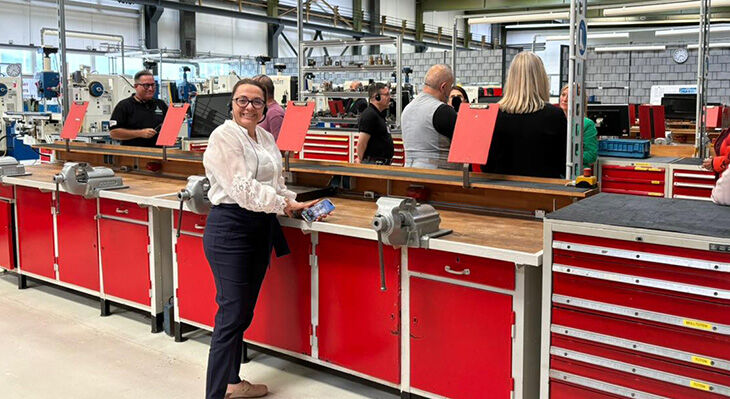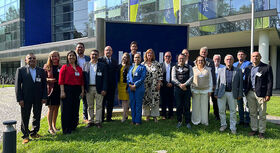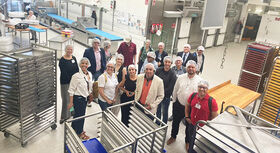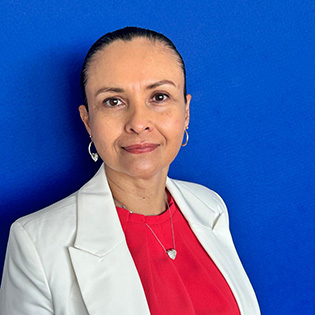Costa Rica aims to convince more educational institutions and companies of dual vocational training
Study visit to Germany provides valuable insights
23.09.2024
How can Costa Rica attract more companies to participate in dual training? This question was at the center of a study trip. Eleven representatives from companies, private, and public educational institutions from Costa Rica learned about the dual training system. What insights did they gain?

Innovations in education systems often begin with changes in legislation and are driven by government actors. This was also the case in Costa Rica. Dual vocational training has been enshrined in law in the country for almost five years, and the first training programs were launched two and a half years ago. For dual training to be supported by economic and social partners, it is important to include their voices and jointly shape dual vocational education. Only those convinced of dual training will offer training positions. Therefore, at the request of the Federal Ministry of Education and Research (BMBF), GOVET invited eleven representatives from industry, education, and trade unions to Germany for a study visit. The goal of the study visit was for participants to learn about the dual system in Germany and use this experience to advance its implementation in Costa Rica.

In the welcome address, Alexander Hochradel, BMBF, and Birgit Thomann, Head of the International Department at the Federal Institute for Vocational Education and Training (BIBB), highlighted the complexity of bilateral cooperation between Costa Rica and Germany in vocational education. The rapid implementation of dual vocational training in Costa Rica was outstanding and deserved the highest recognition. As part of the cooperation, Costa Rica will continue to receive support in addressing emerging questions and challenges, emphasized Alexander Hochradel, BMBF.
Antonio Lehmann Gutiérrez, Ambassador of the Republic of Costa Rica, stressed that dual training is part of Germany’s economic strength and welcomed his country’s steps in implementing dual training.
In her presentation on the dual training system, Julia Olesen from GOVET explained key differences from the Costa Rican system. For instance, apprentices in Costa Rica do not sign contracts with companies and receive a scholarship instead of a training allowance. During a cost-benefit analysis with Dr. Felix Wenzelmann, BIBB, it became clear how important it is to gather such data to communicate with companies about the advantages and costs. BIBB collects extensive data every five years and regularly publishes on the topic. (GOVET has a PowerPoint presentation on costs and benefits, see the right-hand column for details).

Dr. Ralf Hermann, GOVET
In recent years, we have had many delegations from Costa Rica visiting us. The exchange was always characterized by great interest, trust in the cooperation between Germany and Costa Rica, and an appreciative atmosphere.
As the visit continued, participants learned about the learning sites and actors in the dual training system. At the Bonn-Rhein-Sieg Chamber of Commerce and Industry (IHK), the group spoke with Teresa Schare, who coordinates the "Training Ambassadors" project. She introduced the extensive support measures that the chambers offer companies in dual training. Through the "Training Ambassadors" format, chambers of industry and commerce as well as chambers of crafts in North Rhine-Westphalia support career guidance in schools, as young apprentices visit general education schools and share their daily training experiences with students. The project excited the group, as it promotes dual vocational training in an authentic, peer-to-peer manner. However, Teresa Schare also addressed challenges: companies in the region are concerned about the shortage of skilled workers and the high number of unfilled training positions.
Thomas Giessler, International Vocational Education Policy Officer at the German Trade Union Confederation (DGB), provided an additional perspective on vocational training. He emphasized that in dual vocational training, there are common interests between industry, society, and the state, which form the basis for constructive collaboration between actors at various levels. All actors are equally involved in tasks related to regulatory work, examinations, and the further development of the vocational education system.
At the Carl-Reuther Vocational College in Hennef, the delegation gained insight into the school-based side of training and observed how, with dedication, professionalism, and a comprehensive understanding of the teaching profession, young people are guided on their path to employment. Principal Thomas Heußner and his colleague Alexa Sauer, responsible for public relations, stressed the importance of adequate time for lesson preparation and follow-up—an issue that teachers in Costa Rica often handle "on the side."

The study visit also included four company visits, in different industries and with various focuses on training.
At the family-run business Gilgen’s Bakery and Confectionery in Hennef, the company owners, along with the responsible trainer and master baker Thorsten Braun, explained the company philosophy and the importance of in-house training. This was the only way the company had grown over the past few decades and secured its future.
At the Althoff Schlosshotel Bensberg, Jörg Stricker, General Manager, and Svenja Steidl, Cluster Director of Human Resources, expressed similar sentiments: the Althoff Group will open two new luxury hotels in Cologne and Frankfurt in the coming years, and additional skilled workers will be needed. In the hospitality industry, it is particularly important to establish reliable structures for training, alongside the often hectic daily business.

Catalina Blanco Araya, Coordinator of the Costa Rican Vocational Education Commission
During my second study visit to Germany, I was again able to gather valuable insights for implementing dual vocational training in Costa Rica. Whether in company culture for dual training, partnerships between SMEs, or the topic of costs and benefits, it is crucial that more educational institutions and companies in Costa Rica are convinced of dual training, as its benefits are clear – both in Germany and Costa Rica! These study trips play a decisive role in allowing participants to learn from Germany's dual model and return home with new ideas and best practices to enrich their own education system.
Lisa Passmann, Head of Training at Haribo in Grafschaft, also provided insight into how such structures can look. A detailed deployment plan, created according to the nationwide training framework plan for each apprentice, ensures that trainees go through all relevant stations in the company. After each station, extensive feedback and evaluation discussions take place, supported by questionnaires and other tools.
At Deutz AG, an industrial company, the delegation participants visited the company’s in-house training workshop in Cologne-Porz, where basic skills in metalwork, electronics, and welding are taught. Training coordinators Frank Opitz and Giuseppe Nicotra emphasized that companies invest not only money but also additional effort to attract and retain apprentices as tomorrow’s skilled workers – and apparently very successfully, with an almost complete retention rate of apprentices.
In the closing workshop, participants reflected on the benefits of dual vocational training and how it can be further emphasized in Costa Rica. All participants were visibly impressed and inspired to advance the implementation of dual training in their organizations and companies, seeing themselves as ambassadors for dual training in Costa Rica.
Background on cooperation with Costa Rica
Germany and Costa Rica have been cooperating in vocational education since 2016 based on a joint declaration of intent between the Federal Ministry of Education and Research (BMBF) and the Costa Rican Ministry of Education (MEP). The BMBF supports the "Commission for the Promotion of Dual Vocational Training" (CAP) in an "observer status." This commission consists of representatives from government ministries, private sector institutions, and social partners and makes political-strategic decisions on the design, financing, and institutional and legal consolidation of dual vocational training. In addition, the BMBF, through GOVET, advises the Costa Rican Ministry of Education on the operational implementation of "Educación Dual."
Through dialogue, consultation, delegation trips, and expert consultations, the BMBF has contributed to the passage of a law on dual vocational training in Costa Rica in 2019.
A decree was issued for the introduction of dual training. On August 12, 2019, the parliament passed the dual vocational training law, which became effective a month later. To further support the reforms in the partner country, vocational education research, as well as the participation of economic and social partners in vocational education in Costa Rica, are currently being strengthened through two additional BMBF projects (CoRiVET and CoRiCert).